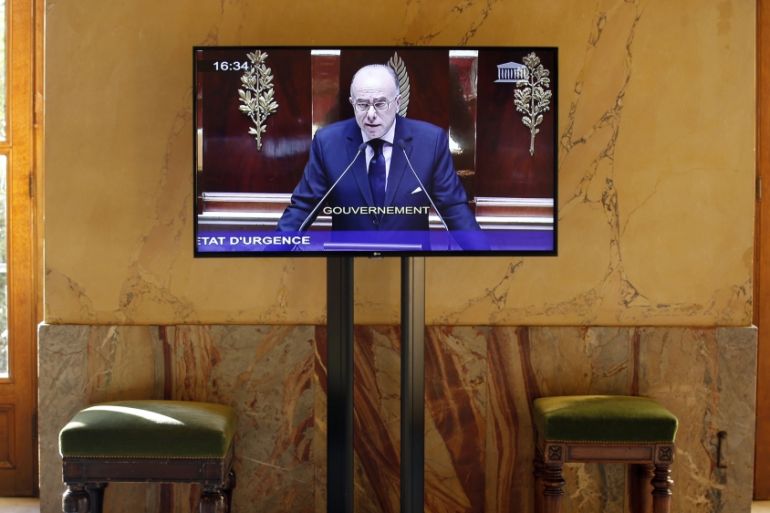France state of emergency ‘extended on slim evidence’
Officials have not shown enough evidence to prove extension is needed to prevent further attacks, rights groups say.

France’s decision to extend the state of emergency was passed on slim evidence that it would be effective in reducing the “terror” threat, rights groups and activists have said.
As was widely expected, the French parliament on Tuesday voted for a three-month extension until May 26, allowing authorities to keep carrying out warrantless police raids and putting people under house arrest without prior authorisation of a judge.
Keep reading
list of 4 itemsParis attacks suspect apologises to victims, seeks forgiveness
Main Paris attacks suspect Abdeslam says he ‘didn’t kill anyone’
Security high in Paris as biggest trial begins over 2015 attacks
Interior Minister Bernard Cazeneuve argued in Tuesday’s debate that the threat of new “terrorist” violence remains very high.
READ MORE: France extends state of emergency until late May
But critics say that the state of emergency undermines fundamental freedoms, and should be used only under exceptional circumstances, which are yet to be proven by officials.
“Under international rights laws, there are clear criteria under which governments can declare a state of emergency,” Marco Perolini, an Amnesty International researcher, told Al Jazeera on Wednesday.
“We don’t think the government has produced evidence which is necessary for authorities to extend the state of emergency.
“Examples of evidence should include the type of emergency authorities face, which have to reach the threshold of threatening the life of the nation for a state of emergency to be declared.”
‘Discriminatory raids’
Perolini warned that emergency measures have so far been relatively ineffective, as he accused authorities of disproportionately targeting the country’s Muslim minority.
There have been at least 3,200 raids and some closures of mosques and businesses, while the counterterrorism unit of the Paris prosecutor’s office has opened only five terrorism-related investigations.
READ MORE: French police ‘abuse’ Muslims under emergency laws
French President Francois Hollande declared a state of emergency after the November 13 attacks across Paris which left 130 people dead.
The attacks were claimed by the Islamic State of Syria and the Levant (ISIL) group.
ISIL’s claim triggered a backlash against Muslim communities – not just in France, but across Europe and elsewhere.
There are between 5.5 million and 6.2 million Muslims in France, or roughly 7.6 percent of the total population – making the group the largest Muslim minority in Europe.
“After the Paris attacks, we did not oppose the state of emergency. But now we are more critical about this because there are huge problems with the implementation of these measures,” Amnesty’s Perolini said.
OPINION: France’s anti-terror measures are unconstitutional
Human Rights Watch and Amnesty International published separate research at the beginning of February, pointing to cases in which excessive force had been used in raids, leading to human rights violations including violence.
Citing dozens of testimonies, the groups said that since November 13 France carried out abusive and discriminatory raids and house arrests against Muslims, traumatising and stigmatising those targeted, including children and the elderly.
“It’s concerning to see that some of these measures targeted Muslims based on their religious practice, and that is in a context in which Muslims in France already felt discriminated by authorities,” said Perolini.
He explained that before attacks in November and January – when armed men targeted the Charlie Hebdo magazine and a Jewish supermarket, killing 17 people – those of the Islamic faith were already discriminated against in France by not having equal access to jobs, and as they were banned from wearing religious symbols and clothing.
“Islamophobic attacks have increased,” said Perolini. “That would require a strong stand [of support] from authorities, which is not forthcoming at the moment…The emergency state is quite likely to further polarise society.”
READ MORE: French civil liberties and the ‘spirit of sacrifice’
Yasser Louati, the Paris-based spokesman for Collective Against Islamophobia in France, also doubted there was enough evidence to support an extension of emergency law.
“You can install the state of emergency, but you have to prove it,” he told Al Jazeera.
“The government is acting alone without taking into consideration warnings from civil society and the victims [of raids which used excessive force]. Muslims feel targeted as though we are the enemy.”
‘France’s illness’
The state of emergency can be renewed indefinitely, requiring parliamentary approval every four months.
Looking ahead, comments by the French Prime Minister Manuel Valls were cited as possible inidicators of how much longer the measures could be in place.
OPINION: France must remain a vibrant and plural democracy
In an interview with the BBC in January, Valls said that the emergency state could be extended “as long as it is necessary” because of the threat from ISIL.
“We have seen that defeating terrorism is not an easy task in history,” Samia Hathroubi, a French-Tunisian human rights activist, told Al Jazeera.
“It seems like our government does not have any kind of political vision of our foreign policy and our domestic affairs.”
Along with a proposed amendment to the constitution which would in effect force dual citizens who had served sentences for crime relating to terror out of the country following imprisonment, the emergency state “proves that the line between this government and far-right ideas is becoming very thin and blurred,” added Hathroubi.
“In terms of democratic values and debate, the state emergency is the symbol of France’s illness regarding keeping a balance between fighting terrorism, which is a serious question, and keeping our values and sticking to them.”
Follow Anealla Safdar on Twitter: @anealla